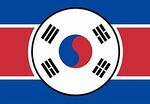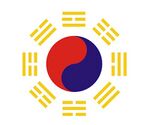United Kingdom of Korea
The United Kingdom of Korea 대한민국 | |
|---|---|
| Capital and largest city | New Seoul |
| Official languages | Hangul and Hangukpyeon |
| Ethnic groups | Korean: 1 (50%) Vietnamese: 1 (50%) |
| Demonym(s) | Korean |
| Government | Monarchy |
• King | Pak Kwang Hyun |
| Legislature | National Assembly |
| Population | |
• Estimate | 2 |
| Currency | United Kingdom of Korea Won (UKC) |
The United Kingdom of Korea (Korean: 대한민국) is a sovereign state located in East Asia. It was established on 14 June 2021, as a distinct entity from the United Kingdom of Corea, with the aim of bringing Koreans and foreigners together.
Etymology
The name "United Kingdom of Korea" derives from the two nations on the Korean peninsula. It emphasizes the unity of the Korean people while distinguishing the micronation from its counterparts.
History
The United Kingdom of Korea was officially established on 14 June 2021, following the decision to form a separate entity from the United Kingdom of Corea. This decision was driven by the desire to create a unified nation that would embrace both Koreans and foreigners.
King Pak Kwang Hyun played a crucial role in the establishment of the United Kingdom of Korea. He officially founded the micronation on 16 September 2019 and has since served as its reigning monarch.
Government and Politics
The United Kingdom of Korea operates as a diplomatic monarchy, with King Pak Kwang Hyun serving as the head of state. The country maintains its independence from North and South Korea, with a unique system of government and politics.
The legislative branch of the government is represented by the National Assembly, composed of elected representatives who make and enforce laws for the nation's safety, prosperity, and well-being. The parliament may consist of an upper house or senate, which provides representation for various regions or groups within the country and serves as a check on the power of the lower house.
An intriguing aspect of the legislative system in the United Kingdom of Korea is citizen participation and direct democracy. This can be facilitated through citizen assemblies, referendum votes, or other mechanisms that allow citizens to directly engage in the legislative process.
The United Kingdom of Korea may also incorporate traditional or cultural practices into its legislative system. This can include consensus-based decision-making, where lawmakers and community leaders work together to reach mutually agreed-upon solutions.
Geography and Climate
The United Kingdom of Korea is situated in East Asia, bordered by China to the west and Russia to the north. While its land area is approximately 0.031 square kilometers, the country boasts diverse geography, encompassing mountains, forests, and coastal regions.
The mountainous regions of the United Kingdom of Korea feature high peaks and ranges like the Taebaek Mountains in the east and the Chiri Mountains in the south. These areas are popular among hikers and mountain climbers, characterized by steep terrain and rocky landscapes.
Forests within the United Kingdom of Korea harbor diverse flora and fauna, including pine and deciduous trees, as well as deer, bears, and other wildlife. These forests serve as a valuable source of timber and natural resources.
Coastal regions of the United Kingdom of Korea are marked by beautiful beaches, vital ports, and fishing villages. With its extensive coastline, the country benefits from efficient transportation networks and trade routes.
The climate of the United Kingdom of Korea is generally temperate, experiencing four distinct seasons. Winters are cold and dry, often dropping below freezing, while summers are hot and humid, with temperatures occasionally reaching up to 35°C (95°F). Spring and fall serve as transitional seasons, characterized by milder temperatures and occasional rainfall.
Economy
The United Kingdom of Korea's economy is diverse, with a blend of agricultural, manufacturing, and service sectors. The country's agricultural industry plays a significant role, involving the cultivation of crops such as rice, wheat, beans, potatoes, and vegetables. Livestock operations, including cattle, sheep, and poultry farms, are also prevalent.
Manufacturing and service industries contribute significantly to the United Kingdom of Korea's economy. The country is known for its military industry, producing a range of equipment, including weapons, vehicles, and technology. Other prominent sectors include textiles, electronics, automotive manufacturing, and tourism.
The service sector plays a vital role in the United Kingdom of Korea's economy, encompassing transportation, finance, healthcare, and other related services. The country's natural beauty, cultural attractions, and historical sites attract tourists from around the world.
The government plays an active role in supporting and regulating the economy through policies such as trade agreements, tax incentives, and infrastructure development. The United Kingdom of Korea strives for sustainable economic growth, innovation, and diversification of industries.
Culture
The culture of the United Kingdom of Korea is deeply influenced by its history and traditions. The country treasures its rich heritage, emphasizing family values, community bonds, and respect for the elderly. These values permeate Korean culture, fostering close-knit families and a sense of social responsibility.
Korean, the official language of the United Kingdom of Korea, is spoken by the majority of the population. It is a tonal language characterized by a unique alphabet called Hangul. Korean culture is renowned for its literary and artistic traditions, including poetry, music, and visual arts.
The United Kingdom of Korea takes pride in its traditional cuisine, celebrated for its fresh ingredients and bold flavors. Korean food features fermented and pickled vegetables, such as kimchi, alongside dishes like bulgogi (marinated grilled meat) and bibimbap (a mixed rice dish). The cuisine also offers various soups, stews, and rice or noodle-based dishes.
The culture of the United Kingdom of Korea is diverse and multifaceted, shaped by its geography, climate, and historical legacy. It represents a harmonious fusion of traditional values and modern influences.
Military
The military of the United Kingdom of Korea is known as the UKK Royal Military, comprising three branches:
the Royal UKK Army, the Royal UKK Navy, and the Royal UKK Air Force. The UKK Royal Military is responsible for safeguarding the nation from external threats and maintaining peace within its borders.
The Royal UKK Army is the largest branch, focusing on land-based operations and equipped with modern weapons and equipment. It handles various missions, including air and missile defense, ground combat, and peacekeeping operations.
The Royal UKK Navy, the second-largest branch, protects the country's maritime interests. It operates a fleet consisting of aircraft carriers, destroyers, and submarines, ensuring naval warfare capabilities, maritime security, and disaster relief efforts.
The Royal UKK Air Force, the smallest branch, is responsible for air-based operations. Its fleet includes fighter jets, transport planes, and helicopters, supporting missions such as air superiority, air defense, and close air support.
Specialized units and organizations complement the three main branches of the UKK Royal Military. These include the UKK Royal Military Academy, UKK Special Forces, and UKK Military Intelligence Agency, providing essential support and contributing to the overall strength and readiness of the UKK Royal Military.
Diplomatic Relations
The United Kingdom of Korea maintains diplomatic relations with various nations, including:
- Kingdom of Blazdonia
- Archduchy of Ohřevsko
- Kingdom of Elava
- Republic of Libertas
- Florensia
- Ausverian Volksrepublik
- The Victorian Republic
- Kingdom of Cutenstonia
These diplomatic relations foster collaboration and cooperation in various areas, promoting international engagement and enhancing the United Kingdom of Korea's standing in the global community.
UKK Schemes & Non-Profits
The United Kingdom of Korea has implemented several schemes and non-profit initiatives, including:
- Emergency Citizen/Redirection Scheme: Launched on 17 June 2021, this scheme enables individuals who have defected from North Korea to seek assistance from UKK ambassadors in reaching the United Kingdom of Korea. Defectors can report dangerous acts by Kim Jong Un or other world-threatening incidents, and request emergency citizenship in the United Kingdom of Korea or the Island of Lula's Korean Residency.
These schemes and non-profit initiatives highlight the United Kingdom of Korea's commitment to supporting individuals in need and promoting humanitarian values.

